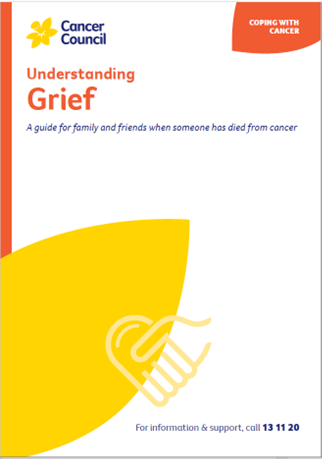- Home
- About Cancer
- Advanced cancer
- Facing end of life
- Caring for someone who is dying
- After the death
After the death
Even when death is expected, it’s common to feel upset, sad or shocked. An expected death is not an emergency and what you need to do next depends on the circumstances.
Learn more about:
- What to do after the death
- Funeral and religious services
- Wills and probate
- Financial matters
- Ways to remember
- Grief
What to do after death
If the person was being cared for at home and was expected to die at home, there is no need to call an ambulance or the police. You can take some time to sit with the person.
You may want to call close family or friends who may have wanted to see the person or say goodbye. If you would prefer not to be alone, call a friend or family member.
If the person dies during the night, you may choose to wait until the morning to take further action. There is no hurry or need to call or let someone know right away.
When you feel ready, call the person’s doctor and a funeral home. The doctor will sign a medical certificate confirming the death. This is needed to make funeral arrangements. The funeral director can register the death with the registry of births, deaths and marriages in your state or territory; the registry will then organise a death certificate.
If the death occurs in a palliative care unit, hospital or residential aged care facility, there’s usually no need to rush. You can have time alone with the person before the nurses explain what needs to be done. Some people want to wait until other family members or friends have had the opportunity to say goodbye.
Several organisations will need to be told of the death. Services Australia has a useful checklist of who may need to be notified.
I had promised Mum that after she died, I would make sure she had her favourite lippy on. I did this at the funeral parlour before the final viewing of her body. She was wearing the dress we had chosen together.
Judith
→ READ MORE: Funeral and religious services
Podcast: Coping with Grief
Listen to more episodes from our podcast for people affected by advanced cancer
More resources
Prof Jane Phillips, Head, School of Nursing and Professor, Centre for Healthcare Transformation, Queensland University of Technology and Emerita Professor Palliative Nursing, University of Technology Sydney, NSW; Prof Meera Agar, Palliative Care Physician, Professor of Palliative Medicine, University of Technology Sydney, IMPACCT, Sydney, NSW; Sandra Anderson, Consumer; A/Prof Megan Best, The University of Notre Dame Australia and The University of Sydney, NSW; Prof Lauren Breen, Psychologist and Discipline Lead, Psychology, Curtin University, WA; David Dawes, Manager, Spiritual Care Department, Peter MacCallum Cancer Centre, VIC; Rob Ferguson, Consumer; Gabrielle Gawne-Kelnar, Counsellor, Psychotherapist and Social Worker, One Life Counselling & Psychotherapy, NSW; Justine Hatton, Senior Social Worker, Southern Adelaide Palliative Services, Flinders Medical Centre, SA; Caitlin MacDonagh, Clinical Nurse Consultant, Palliative Care, Royal North Shore Hospital, Northern Sydney Local Health District, NSW; McCabe Centre for Law and Cancer; Palliative Care Australia; Belinda Reinhold, Acting Lead Palliative Care, Cancer Council QLD; Xanthe Sansome, National Program Director, Advance Care Planning Australia; Kirsty Trebilcock, 13 11 20 Consultant, Cancer Council SA.
View the Cancer Council NSW editorial policy.
View all publications or call 13 11 20 for free printed copies.

